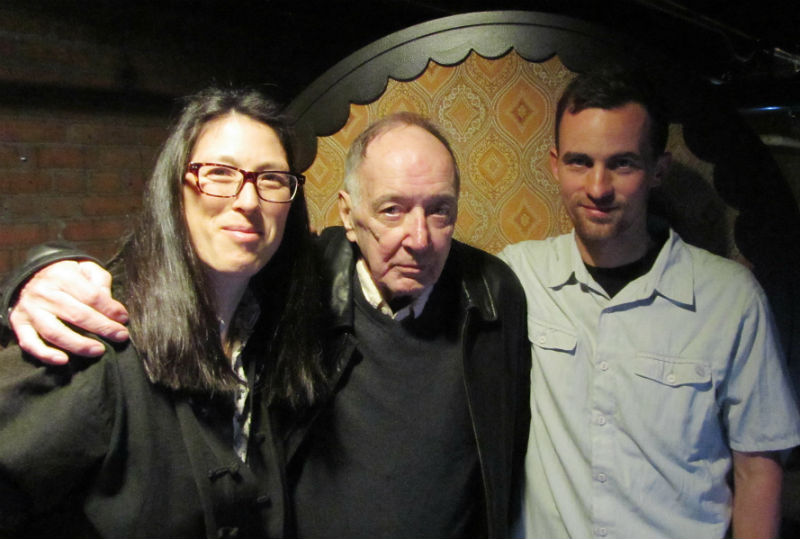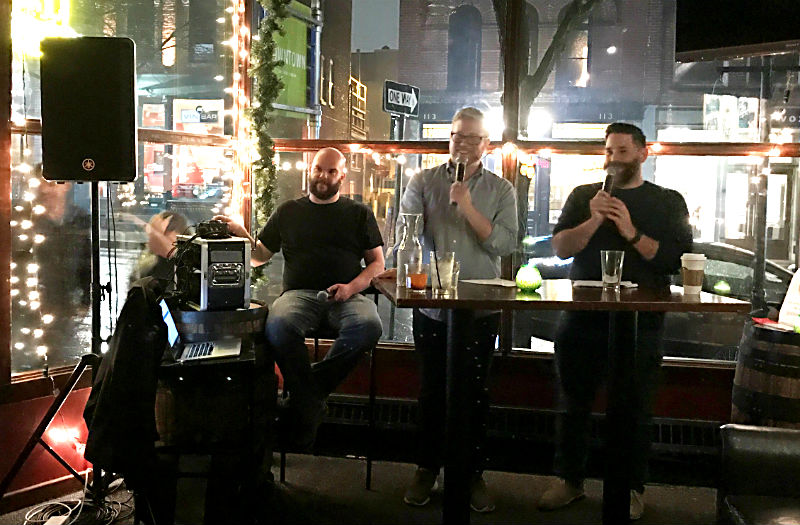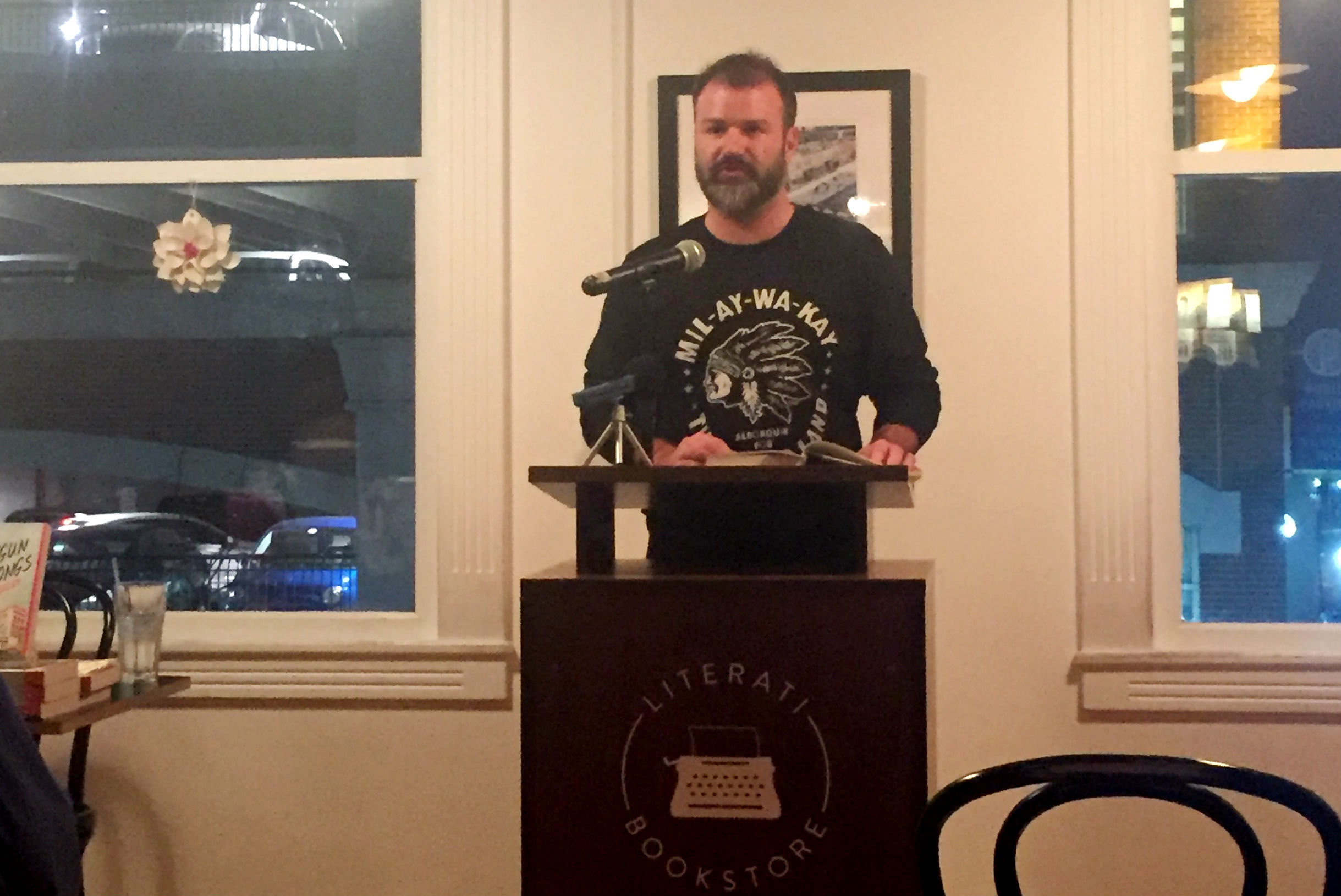AAFF 2017 | Interview with Leslie Raymond, Executive Director
The 55th Ann Arbor Film Festival gets underway Tuesday, March 21, and as artists and film lovers from around the globe prepare to descend upon the Michigan Theater for six days of mind-expanding cinema, Executive Director Leslie Raymond is on a mission to take the country's longest-running avant-garde and experimental film festival back to its all-inclusive roots.
Founded by George Manupelli in 1963, the AAFF has seen its share of shake-ups over the course of the past decade. From the AAFF v. State of Michigan lawsuit that resulted in part from the controversy that erupted over Crispin Glover's award-winning 2005 feature What Is It? to the departure of Program Director David Dinnell last year, Raymond no-doubt had her work cut out for her when she stepped into this pivotal role.
Fortunately for filmmakers and audiences alike, Raymond was no stranger to either the festival or Manupelli's original vision for it as a place where all voices and perspectives are celebrated. Twenty-five years ago, Raymond began her decades-long relationship with the AAFF as an intern under Program Director Vicki Honeyman, whose enduring 14-year run with the festival was longest anyone has served in such capacity other than the founder.
To take the reigns of a festival as celebrated and prestigious as the AAFF requires genuine dedication, and as anyone familiar with Raymond's impassioned 2009 blog post lamenting the "specialized, themed-programming" that had become a primary focus of the festival during that era, there was little question as to where her loyalties lied.
Flash forward eight years, and Raymond is now in the unique position of being able to turn those criticisms into concrete action. Raymond's deep respect for Manupelli's original vision is evident when listening to her speak about her late friend and the festival he conceived, and together with new Associate Director of Programs Katie McGowan, the executive director is on a mission to steer this ship back on course.
With Ann Arbor still recovering from the devastating windstorm dubbed the "largest combined statewide event in history" by Gov. Rick Snyder less than a week before the Opening Night Reception, Raymond was kind enough to take the time out from her hectic schedule to discuss these issues and more with Pulp.
Storytelling With Lessons -- & Jokes: "Mostly Functional Humans" podcast
It's the last Tuesday in February at Alley Bar, and Mostly Functional Humans co-hosts Rich Retyi and Andrew Dooley are sitting in a booth, preparing for their live podcast. Friends and fans pour through the doors in a steady stream, and the upscale dive bar takes on a party atmosphere. Back in the booth, the two co-hosts recall the origins of Mostly Functional Humans. Canadian transplant Retyi was working at MLive when he struck up a rapport with Plymouth native Dooley. Almost immediately, Dooley recognized they were on the same intellectual and comic rhythms, and after conceiving the podcast in this very bar, decided to take it into the studio. As luck would have it, the Ann Arbor District Library was more than happy to accommodate by recording Mostly Functional Humans in its podcasting studio. This is where Matt Dubay -- aka Engineer Matt -- enters the picture. The library’s production supervisor was tasked with recording the Mostly Functional Humans podcast. In a way, most of what you need to know about the tone of the Mostly Functional Humans podcast can be gleaned by noting that the two current sponsors are Alley Bar and Literati Bookstore. Literate yet far from pretentious, it appeals to the entire spectrum of listeners in the town that seems to value an IPA nearly as much as a Ph.D.
Fabulous Fiction Firsts #629, #630 & #631

Fabulous Fiction Firsts #629
Beijing journalist Lijia Zhang's debut novel Lotus is inspired by her grandmother's deathbed revelation that she was sold into prostitution at an early age.
Set in contemporary Shenzhen, China’s “City of Sins”, Lotus is one of the "ji" (Chinese word for chicken, a derogatory name for prostitutes) working at the Moonflower Massage Parlor. Originally from a impoverished village in northern China, she allows her family to think she waitresses in an upscale restaurant, sending her earnings home to support her family and to send her younger brother to university.
Knowing the shelf life of someone in her situation is finite, Lotus casts her eye among her regulars -- Funny Eye, Family Treasure -- hoping for a more permanent arrangement. In the meantime, she befriends Hu Binbing, a quiet and reclusive photojournalist who is hoping his documentary project on the lives of the "ji" will bring him the deserved recognition. But once his photographs of Lotus are published in a national magazine, his standing in the Communist party as well as their relationship is threatened.
"'A Newborn Calf Isn't Afraid of Tigers' is a typical chapter title in Lotus... Readers will find the entire text rich in Chinese proverbs, as well as folk wisdom of a more prosaic variety. Characters employ sage sayings in spoken form, as a kind of parlor game, and the author scatters aphorisms liberally throughout the narrative, with an effect that is both charming and thought-provoking....Some first novels, especially those birthed in creative writing classes, go heavy on self-consciously poetic language ...The images Zhang gives us, in contrast, are uncomplicated, concise and touching" (NPR)
"Pretty Woman but without all the glitz" (Library Journal).
Ann Arbor novelist Camille Pagán is generating buzz with "Forever Is the Worst Long Time"

A few weeks ago, InStyle magazine named Forever Is the Worst Long Time by Ann Arbor-based novelist (and health journalist) Camille Pagán as one of "7 Books You Need to Read in February 2017.”
We’re now in March, of course, but Pagán’s new tale of contemporary friendships and romance gone askew offers a temporary escape hatch appropriate for any time of year.
Forever is Pagán’s third novel; her debut was The Art of Forgetting (2011), followed by Life and Other Near-Death Experiences (2015), which was a bestselling Kindle First selection that got optioned by Jessica Chastain’s production company Freckle Films.
Forever tells the story of James Hernandez, a would-be novelist who ends up writing copy for U-M’s business school. (Pagán is a U-M grad who grew up in Dearborn.) Though James falls for his childhood best friend Rob’s fiancee/wife (Lou) upon meeting her, he buries his feelings, delivers a toast at the wedding, and tries to build his own life. But years later, when Rob and Lou’s marriage falls apart, James is torn between what he wants and loyalty to his friend. In the end, he can’t resist acting on his long-repressed attraction, and the consequences for all three are far-reaching and life-changing.
“I didn’t plan on writing this book,” said Pagán. “I’d planned on writing one about a married couple, and I was just slogging through that when I had the idea for the first chapter [of Forever], and in a day or two, I had the opening chapters done. I just felt like, I know who these people are, whereas with the other project, I didn’t know who I was writing about. … With every book it seems like there’s a fire under me, where I had to get the story out.”
No Fixed Narratives: Bassist James Ilgenfritz at Kerrytown Concert House
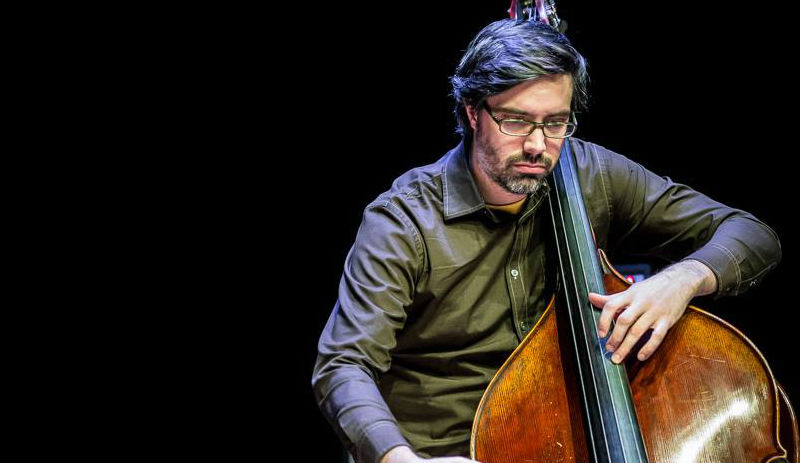
Whether he's reframing William S. Burroughs' cut-up prose as opera with his long-running Anagram Ensemble, fusing progressive rock riffing with avant-jazz in electric trio Hypercolor, or bowing his strings with multiple bows and springs on his own, bassist James Ilgenfritz is regularly questioning perceptions and pushing back against sound barriers.
"Music is a fundamentally abstract art form, as it does not have the type of figurative quality words or images can communicate," Ilgenfritz wrote in an email, describing what inspired him to transcribe the work of composer and saxophonist Anthony Braxton for his 2011 debut solo album, Compositions (Braxton). "But we often give in to the temptation to shoehorn music into fixed narratives and the illusion that meaning can be an absolute."
The Brooklyn, New York-based musician grew up in Monroe and studied music at the University of Michigan. He played with several Ann Arbor and Detroit-based groups, including Bill Brovold's experimental rock troupe Larval, before moving out of state to further his musical path.
In January, Ilgenfritz led a string section playing arrangements he'd written for composer and performer M. Lamar's Funeral Doom Spiritual in Brooklyn. The new monodrama written by Lamar with musician Hunter Hunt-Hendrix (of "transcendental" metal band Liturgy) takes place in the future and "explores radical historical expressions and futuristic longings for destruction of the white supremacist world order."
This month, Ilgenfritz is releasing his second solo album, Origami Cosmos (Infrequent Seams), featuring four new solo works for bass written for him by four different New York composers.
On Wednesday, March 15, Ilgenfritz will give a solo contrabass performance at Kerrytown Concert House featuring music from his new album, his Braxton transcriptions, and an old favorite from his Ann Arbor days by a U-M professor.
Integrated Identities: "The Beauty Queen of Leenane" at the Power Center
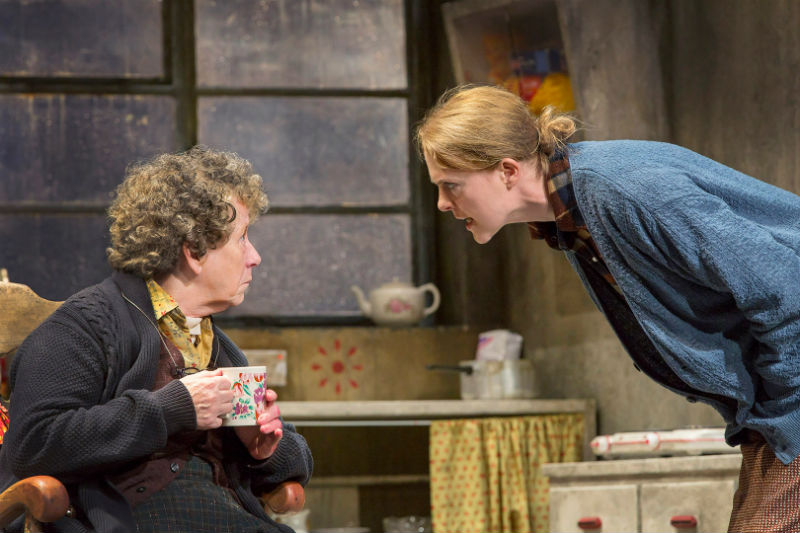
When two ordinary, scribbled-on pieces of paper in an envelope magically morph into a miserable woman’s key to happiness -- and your heart pounds as you hawkishly, breathlessly watch the precarious letter being set down, picked up, walked around the stage, and handed off -- that’s the power of live theater.
But it takes pros to achieve that level of emotionally tense stage magic, and when it comes to interpreting Martin McDonagh’s work, there may be none on Earth that can match Ireland’s renowned Druid Theatre Company, which performed The Beauty Queen of Leenane March 9-11 at the Power Center, courtesy of University Musical Society.
Here’s to Collaboration: Behind the Scenes of the Kickshaw Lab

Last weekend, I had the opportunity to sit in on a rehearsal of Kickshaw Theatre’s new devised work: Here’s to You, Here’s to Me. I work with the organization, but I’ve never been in a rehearsal room where “devising” is happening. It was awesome.
After a group warm-up, the actors took the stage and performed the material they have developed so far. The story is still being shaped (and may change between now and the performance), but it’s loosely framed as a party of friends, celebrating and exploring the ritual of toasting. The show includes original songs and dialogue that the cast has collectively written in rehearsal. One song, a toast to a cast member’s mom, was re-worked during rehearsal. The ensemble re-ordered verses, changed lyrics, and improvised musical riffs and harmonies. In the end, the song came out sounding like a 1980s rock anthem!
Tools Crew Live: Bill Van Loo
Downloads:
➥ MP3 for "A Night at the Library"
➥ 720p video, 480p video or 240p video
Bill Van Loo is a polymath.
“The description I use to describe to people what I do is I’m a maker, teacher, musician, and photographer,” he said, “and at any given point in my life, one or more of those areas is going to be more prevalent or in the forefront than others.”
In the late ‘90s and early 2000s, Van Loo was part of the Detroit techno scene, including performing on the Underground Stage in 2000 at the first Detroit Electronic Music Festival, the now-legendary electronic-music event now known as Movement. He released most of his music on his own chromedecay label, and was part of a collective called Thinkbox, which created audio-visual multimedia performances and performed at the Movement Festival in 2003 and Montreal’s huge Mutek fest in 2004.
But for much of the past decade-plus, Van Loo has focused on his teaching career. He’s currently the technology, engineering, and design educator at A2 STEAM, the three-year-old K-8 school that has a heavy focus on project-based learning and tech. At the end of 2016, Van Loo finished his master’s degree in educational media and technology from Eastern Michigan University -- and suddenly found himself with enough free time to bring music to the forefront once again.
Van Loo’s currently working on new material in his home studio and hopes to release an EP or mini-LP on Bandcamp in the spring. We took advantage of Van Loo's sudden return to music by having him be the featured artist in our second Tools Crew Live video series where we have musicians use gear from the Ann Arbor District Library's Music Tools collection to create jams. (Fred Thomas was our first artist, which you can view here.)
Van Loo recorded the videos on January 3 and on February 16 we talked about the songs he performed -- one techno banger, one ambient guitar bliss-out -- and the gear he chose.
Emptying in, Emptying out: Joseph Scapellato at Literati

Big Lonesome, Joseph Scapellato's first collection of stories, was published at the end of February. Divided into three parts -- "Old West," "New West," and "Post-West" -- the stories form a triptych, a landscape, a cave-painting; they begin and end and begin again, all-too-familiar and too new, digging into what we think we know about the American West.
The West, a central character in most of the stories, looms out and over, its flowers and cacti and creatures blooming, rustling the pages. This is a collection that follows a cowgirl, "born of a beef cow," of "ours"; follows a mutt-faced cowboy whose scar-smile brings him home to strangers; follows a man whose fiancée's dog sees and hears more than the man ever could. This is a book that deserves to be passed between friends, outsiders, enemies; to be shouted from on high and from on low.
Scapellato, an assistant professor of English at Bucknell College, earned his MFA from New Mexico State University. He will be in conversation with Claire Vaye Watkins on March 10 at Literati Bookstore. We spoke with Scapellato in anticipation of that reading.
Small Towns, Universal Emotions: Nickolas Butler at Literati
“I couldn’t write about something like the New York City social scene, because I know nothing about it,” said Nickolas Butler frankly at his reading at Literati on Wednesday, March 8. Butler’s third book, The Hearts of Men, has just been released and it shares a rural Wisconsin setting with his previous two books, Shotgun Lovesongs and Beneath the Bonfire.
Butler himself lives outside of Eau Claire, Wisconsin, with his family and is able to brilliantly capture rural Midwestern life in his work, as only someone who truly lives it would be able to do.
“In part, I write about these characters and this setting because that’s what I’m familiar with,” said Butler. “Although I have a very nice house and a very nice property, it’s just a little bit down the road until I’m in what is essentially rural poverty. I go into Cleghorn, which is the nearest town, and there’s literally one intersection and there’s a bar and a taxidermy shop.” He laughed a little. “You can go in [to the bar], and you and four of your buddies could drink as much as you possibly could and there’s no way that you could ever run a tab up in there that’s more than $65.”


